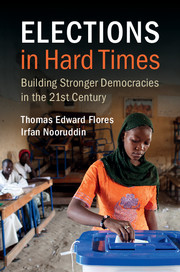Book contents
- Frontmatter
- Dedication
- Epigraph
- Contents
- List of figures
- List of tables
- Preface
- Part I From Elections to Democracy: Theory and Evidence
- Part II Challenges Facing Elections in Developing Countries
- Part III Democracy Promotion for the Twenty-first Century
- Appendix A Data Appendix: Sample, Variables, Sources
- Appendix B Main Statistical Results
- Notes
- Bibliography
- Index
Preface
Published online by Cambridge University Press: 05 September 2016
- Frontmatter
- Dedication
- Epigraph
- Contents
- List of figures
- List of tables
- Preface
- Part I From Elections to Democracy: Theory and Evidence
- Part II Challenges Facing Elections in Developing Countries
- Part III Democracy Promotion for the Twenty-first Century
- Appendix A Data Appendix: Sample, Variables, Sources
- Appendix B Main Statistical Results
- Notes
- Bibliography
- Index
Summary
Democracy is in global retreat forty years after the Third Wave of Democracy began. The Arab Spring has ended in reinforced authoritarianism in Egypt, civil war in Libya, and the most fragile of democratic politics in Tunisia. Turkey's Recep Tayyip Erdo?gan continues to crack down on the press and punish dissent, firing or reassigning thousands of police officers and judges. Elections in Sub-Saharan Africa are followed by violence as often as peace. The likes of Paul Kagame, Vladimir Putin, Robert Mugabe, and Hun Sen, meanwhile, continue in power as they “win” tarnished elections. In Hungary, Prime Minister Viktor Orbán openly advocates abandoning liberal democracy in favor of an “illiberal state.” Even in Western Europe, a supposed bastion of electoral democracy, confidence in democracy seems to be declining amid high unemployment and hostility towards migrants.
Democracy promoters have reacted to their cause's perceived global decay with public alarm and despondence. Freedom House's Freedom in theWorld 2015 report is sub-titled “Discarding Democracy: Return to the Iron Fist,” betraying its gloomy outlook. The National Endowment for Democracy, meanwhile, recently published a new volume titled Democracy in Decline?, which includes an entry from Francis Fukuyama, who famously predicted in the heady days of the early 1990s that liberal democracy would be the endpoint of history. If an organization whose entire mission centers on supporting democratic change questions whether democracy is in decline, the answer almost certainly would seem to be yes. Even The Economist, the classically liberal news magazine, dedicated a special issue in 2014 to this democratic malaise, asking, “What's gone wrong with democracy?”
For many, the answer to this question is elections themselves. Rather than seeds of democratic change, elections have become a veritable scapegoat, blamed for everything from entrenching autocrats to causing civil war. Preeminent scholars in political science have painstakingly shown how incumbents cheat to win elections, even as Western monitoring organizations try to stop them. Bad elections, they argue, yield bad democracy. The Economist itself blames elections when it contends that, “One reason why so many democratic experiments have failed recently is that they put too much emphasis on elections and too little on the other essential features of democracy.”
In this book, we offer a different interpretation of elections’ role in democratic change.
- Type
- Chapter
- Information
- Elections in Hard TimesBuilding Stronger Democracies in the 21st Century, pp. xv - xxPublisher: Cambridge University PressPrint publication year: 2016



